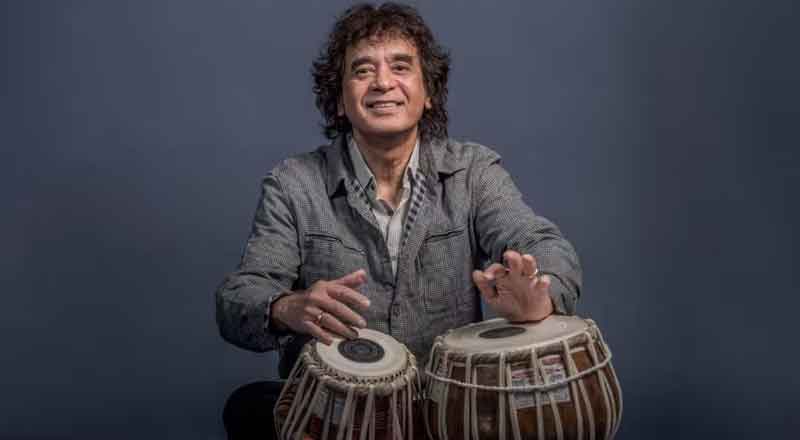A Giant in Indian Classical Music Passes Away
The world of music bid farewell to a true virtuoso on Monday as Zakir Hussain, the tabla maestro whose rhythms resonated globally, passed away at the age of 73 in San Francisco, USA. Known for his pioneering contributions to Indian classical music and his groundbreaking collaborations with international artists, Hussain succumbed to complications arising from idiopathic pulmonary fibrosis, his family confirmed. With a career spanning six decades, his passing marks the end of an era in both Indian and global music communities.
A Childhood Immersed in Rhythm
Born on March 9, 1951, in Mumbai, India, Zakir Hussain was destined for greatness. The eldest son of legendary tabla virtuoso Ustad Allah Rakha, Hussain was immersed in music from a young age. Under his father’s strict guidance, he demonstrated exceptional talent early on. By the age of seven, he was performing publicly, and by twelve, he embarked on international tours, showcasing his prodigious skill and laying the foundation for an illustrious career.
The Rise of a Global Music Ambassador
Zakir Hussain’s contributions transcended the boundaries of Indian classical music. Widely regarded as one of the greatest tabla players of all time, he collaborated with an array of global artists. His partnership with guitarist John McLaughlin, violinist L. Shankar, and percussionist T.H. ‘Vikku’ Vinayakram in the 1970s birthed Shakti, a fusion ensemble blending Indian classical music with jazz. This groundbreaking experiment not only bridged cultural divides but also created a new genre of music.
Beyond Shakti, Hussain’s collaborations included work with George Harrison, Ravi Shankar, Mickey Hart, and Van Morrison. His 1991 album Planet Drum with Mickey Hart won the first-ever Grammy Award for Best World Music Album, further solidifying his role as a global ambassador of Indian music. He continued to innovate, winning multiple Grammy Awards throughout his career, including three at the 66th Grammy Awards in 2024.
Honoring a Lifetime of Achievements
Hussain’s exceptional talent and contributions were recognized with numerous prestigious accolades. In India, he was conferred with the Padma Shri in 1988, the Padma Bhushan in 2002, and the Padma Vibhushan in 2023, among the nation’s highest civilian honors. His other accolades included the Sangeet Natak Akademi Award in 1990 and the National Endowment for the Arts’ National Heritage Fellowship in 1999.
In 2016, Hussain’s international recognition reached a new peak when he was invited by then-President Barack Obama to perform at the International Jazz Day All-Star Global Concert at the White House. These honors reflected the profound impact of his music on audiences across cultures and continents.
The Maestro’s Distinctive Style
What set Zakir Hussain apart from his contemporaries was not just his technical virtuosity but also his ability to innovate while preserving tradition. His performances merged the intricate rhythms of Indian classical music with global influences, introducing the tabla to audiences unfamiliar with its rich heritage. Hussain often described the tabla player’s role as akin to a psychiatrist, responding intuitively to the mood and intentions of fellow musicians, making every performance a unique experience.
His philosophy of fusing tradition with innovation allowed him to collaborate seamlessly with artists across genres. This adaptability ensured that the tabla found a place in jazz, rock, and even global pop music, forever altering its role in contemporary music.
A Multifaceted Artist in Film and Education
Zakir Hussain’s contributions extended beyond the concert stage. He composed music for critically acclaimed films such as Vanaprastham (1999), which was showcased at the Cannes Film Festival, and Heat and Dust (1983). He also acted and contributed to soundtracks in films like Little Buddha (1993) and Apocalypse Now (1979). As an Indian music advisor to filmmakers, he played a pivotal role in bringing the nuanced textures of Indian classical music to global cinema.
As an educator, Hussain was equally impactful. He mentored a new generation of tabla players through masterclasses and workshops worldwide. He also taught at prestigious institutions like Stanford University and Princeton, where he served as an Old Dominion Fellow in 2005-2006. His efforts ensured that his knowledge and passion for music would inspire future musicians.
Personal Life: The Heart of the Maestro
Despite his global fame, Zakir Hussain remained deeply connected to his roots. He married Antonia Minnecola, a Kathak dancer who also served as his manager, and the couple raised two daughters, Anisa and Isabella, both of whom are involved in the arts. Hussain’s commitment to his family was matched by his dedication to his craft. He famously refrained from performing at private gatherings or weddings, choosing instead to share his art in settings dedicated to music.
A Life Resonating Through Generations
Zakir Hussain’s passing leaves an indelible void in the world of music. Yet, his legacy endures through his recordings, collaborations, and the countless lives he touched. As a performer, educator, and cultural ambassador, he elevated Indian classical music to unparalleled global prominence. His innovative spirit and unwavering commitment to his art will continue to inspire musicians for generations to come.
The Rhythm of Eternity
The world mourns the loss of a maestro whose tabla beats transcended boundaries and whose music brought people together. Zakir Hussain’s journey—from a prodigious young talent to an international icon—is a testament to his extraordinary talent and relentless dedication. As his rhythms echo across time, his contributions to music and culture will forever remain a part of the global artistic tapestry. Ustad Zakir Hussain’s life may have ended, but his music will continue to resonate, a timeless rhythm in the symphony of humanity.
(With inputs from agencies)





